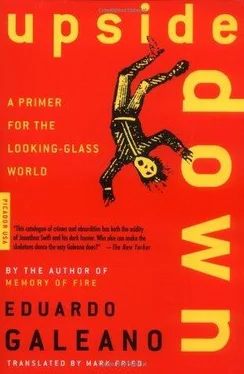The dominant means of communication lie in a few hands that are always becoming fewer, and usually serve a system that reduces human relations to mutual use and mutual fear. The Internet galaxy has opened unexpected and valuable opportunities for alternative expression, allowing many voices that are not the echoes of power to broadcast their messages. But access to the information superhighway is still the privilege of developed countries, where 95 percent of users reside, and commercial advertising is doing its all to turn the Internet into the Businessnet. This new medium for freedom of communication is also a new medium for freedom of commerce. On the virtual planet there’s no risk of meeting up with customs officers or governments crazed with delusions of independence. In the middle of 1997, when advertising already occupied far more space on the Internet than educational material, the president of the United States ventured that every country in the world should keep the sale of goods and services by Internet duty-free, and from that point on, this issue has been high on the U.S. agenda in international organizations.
Control of cyberspace depends on telephone lines, and it’s no accident that the privatizing wave of recent years has yanked the phones out of the public’s hands around the world and given them over to the great communications conglomerates. Foreign phone companies have received far more U.S. investment than any other sector, while the concentration of capital has forged ahead at a gallop. Up to the middle of 1998, eight megacompanies dominated the phone trade in the United States; in just a week, these were reduced to five.

Television, the movie industry, the mass-circulation press, the great publishing houses and record companies, and the biggest radio stations, too, are all marching double-time toward monopoly. The global mass media have set the price of freedom of expression in the clouds; the opinioned, who have the right to listen, are ever more numerous, while the opinionators, who have the right to make themselves heard, are ever fewer. In the years following World War II, independent media still provided broad coverage of news, opinion, and the creative adventures that reveal and nourish cultural diversity. By 1980, the devouring of medium-sized and small companies had put most of the planetary market under the control of fifty corporations. Since then, independence and diversity have become rarer than a green dog.
According to producer Jerry Isenberg, the erosion of independent television in the United States over the past twenty years has been overwhelming. Independent companies used to supply between 30 and 50 percent of what was seen on the small screen; today the figure is barely 10 percent. Also revealing are the world’s advertising statistics: currently, half of all the money the world spends on advertising goes down the throat of only ten conglomerates that produce and distribute everything you can imagine involving images, words, and music.
Over the past five years the biggest U.S. communications companies doubled their international sales: General Electric, Disney/ABC, Time Warner/CNN, Viacom, Tele-Communications Inc. (TCI), and Microsoft, Bill Gates’s baby, which rules the software market and has successfully broken into cable TV and TV production. These giants exercise oligopolistic power, which they share globally with the Murdoch empire, Sony of Japan, Bertelsmann of Germany, and one or two more. Among them they’ve woven a global spider’s web, their interests linked like so many knotted threads. Although these mastodons of communication pretend to compete, and sometimes even come to blows or exchange insults to satisfy the spectators, at the moment of truth the spectacle ends and they calmly carve up the planet.
The Globalized Hero
Secret Agent 007 no longer works for the British crown. Today James Bond is a sandwich-board man for many companies from many countries. Every scene in his 1997 film, Tomorrow Never Dies, is an advertisement. The infallible Bond checks his Omega watch, talks on an Ericsson cell phone, leaps from a rooftop onto the roof of a Heineken beer truck, flees in a BMW rented from Avis, pays with a Visa card, drinks Dom Pérignon champagne, undresses women previously dressed by Armani and Gucci and coiffed by L’Oréal, and fights an opponent in Kenzo attire.
By grace of cybernetic providence, Bill Gates amassed a sudden fortune equivalent to the entire annual budget of Argentina. In the middle of 1998, the United States government charged Microsoft with using monopolistic methods to crush its competitors. Some time previously, the federal government had put together a similar suit against IBM; after thirteen years of back-and-forth, the matter was left in murky waters. Judicial law can’t do much when faced with economic law, and capitalism brings on the concentration of power as inevitably as winter brings on the cold. The antitrust laws that once threatened the kings of oil and steel are unlikely ever to imperil the planetary machinery that sets the stage for the most dangerous of despotisms, that which acts on the heart and conscience of all humanity.
Technological diversity is said to be democratic diversity. Technology places images, words, and music within the reach of all, as never before. But this marvel becomes a dirty trick if private monopoly ends up imposing a one-image, one-word, one-tune dictatorship. Even taking into account the exceptions — and fortunately there are exceptions and they aren’t so few — this diversity tends to offer us thousands of ways of choosing between the same and the same. As Argentine journalist Ezequiel Fernández-Moores said of the news: “We’re told about everything, but we don’t find out a thing.”

Although the structures of power have become more international and it’s difficult to distinguish any borders, to say that the United States sits at the center of the nervous system of contemporary communications wouldn’t be a sin of primitive anti-imperialism. U.S. companies rule in film and TV, in information and computers. The world, an immense Wild West, begs to be won. For the United States, the global reach of its mass messages is a matter of state. The governments of the South tend to think of culture as playing a decorative function, but the tenants of the White House, at least on this matter, aren’t the least bit stupid. Every president knows that the political importance of the culture industry is at least as great as its economic value, great as that is. For years, to give an example, the government has used diplomatic pressure to promote Hollywood’s products, which never err on the side of diplomacy, in countries that attempt to protect their own national film industries.
Exemplary Lives/4
Admirers and enemies concur: his main virtue is his lack of scruples. They also appreciate his capacity for extermination, essential for success in today’s world. Busting unions and devouring competitors, Rupert Murdoch arose from nowhere to become a magnate of world communications. His meteoric career began when he inherited a newspaper in far-off Australia. Today he is the owner of 130 dailies in several countries, including the venerable Times of London and the English tabloids that in their glory days reported on who slept last night with Princess Diana. This modeler of minds and consoler of souls made the world’s biggest investment in satellite communications technology and controls one of the largest television networks on the planet. He also owns the Fox movie studios and HarperCollins publishing house, where he published several masterworks of world literature, including those of his friends Margaret Thatcher and Newt Gingrich.
Читать дальше













